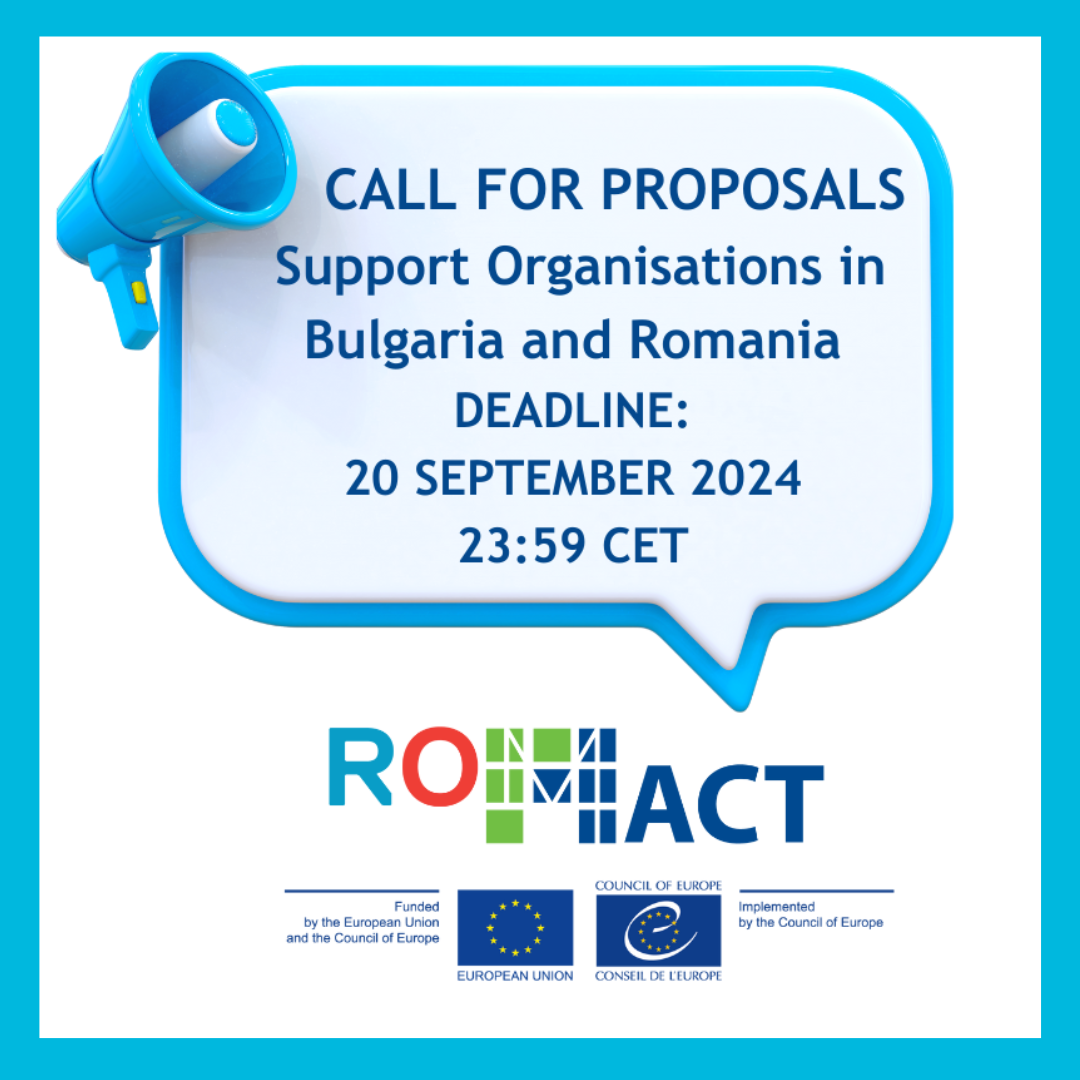Call for proposals - Grants for ROMACT "Support Organisations" in Bulgaria and Romania - Deadline - 20 September 2024
This call for proposals is launched under the joint project of the Council of Europe and the European Commission ROMACT. The objective is to co-fund national projects that assist National Support Teams in implementing the ROMACT methodology in Bulgaria and Romania with an aim to build local capacity for the integration of Roma communities.
The deadline for applications is 20 September 2024 (23:59 CET).
For more information on this call and the application procedure, please refer to the documents and the QUESTIONS & ANSWERS section below.
Bulgaria:
- Call for proposals
- Appendix I Application Form
- Appendix II Estimated Budget
- Appendix III Grant Agreement Template (for information only)
Romania:
- Call for proposals
- Appendix I Application Form
- Appendix II Estimated Budget
- Appendix III Grant Agreement Template (for information only)
QUESTIONS AND ANSWERS
1- How will the compliance of the project with the ROMACT methodology be evaluated and what level of detail is expected in the description of the proposed activities to demonstrate this compliance?
The application must take into account the ROMACT methodology as detailed in the Programme handbook. Description of activities should clearly demonstrate an understanding of the methodology and of the local context in which the action should take place.
2- What are the specific expectations related to the co-financing of the project, including the minimum amount required and the accepted forms of contribution (financial, human resources, contributions in kind)?
As indicated in the Call, each Grantee shall be required to contribute to the project either by way of its own resources or by contribution from third parties. The co-financing may take the form of an in-kind contribution, or by means of a financial contribution. There is no minimum threshold for financial contributions. Examples of in-kind contribution are office space, computers, office equipment, logistic support, human resources, etc.
3- Is there flexibility in adjusting the budget or activities after signing the grant agreement, in case of unforeseen changes in the needs of the communities or in the implementation context?
Amendments to the provisions of grant agreements are possible, however the maximum amount of the grant cannot be changed. Please refer to the Article 16 of the Grant Agreement, Appendix III of the Call for proposals.
4- What is the minimum expected number of communities approached within the project?
There is no minimum expected number of Roma communities that project should approach. Each project proposal should describe the activities related to Roma communities in accordance with ROMACT methodology. As stated in the Call, up to 20 municipalities will be selected throughout the implementation of the project.
5- If the ROMACT Program has already been implemented in one of the targeted communities (eg Insuratei, Faurei), are the respective communities eligible to be addressed in the project?
Communities where ROMACT has already been implemented may still be eligible for further support based on the community and local administration's willingness and needs. Each case will be evaluated individually.
6- Will the facilitators and coordinators be provided and paid by the Council of Europe or do we need to foresee fees for them in the project budget?
The national facilitator coordinators are directly paid by the Council of Europe. Facilitators fees, subsistence and travel costs for field visits should be included in the estimated budget under respective separate budget lines.
7- Can we foresee the capacity building activities in the budget even if the needs for capacity building would be assessed within the project?
The costs for capacity building activities can included in the budget, usually in budget lines under budget heading 5.5. Conferences/seminars. Please note that the estimated budget is part of the project proposal, which can be adjusted during the implementation through amendment.
8- We would like to foresee capacity building for CAG members in the estimated budget, would these costs be eligible?
Costs for capacity building activities for CAG members would be eligible costs, subject to provisions of the Article 12 “Eligible Costs” of the Grant Agreement template and instructions in the estimated budget template.

